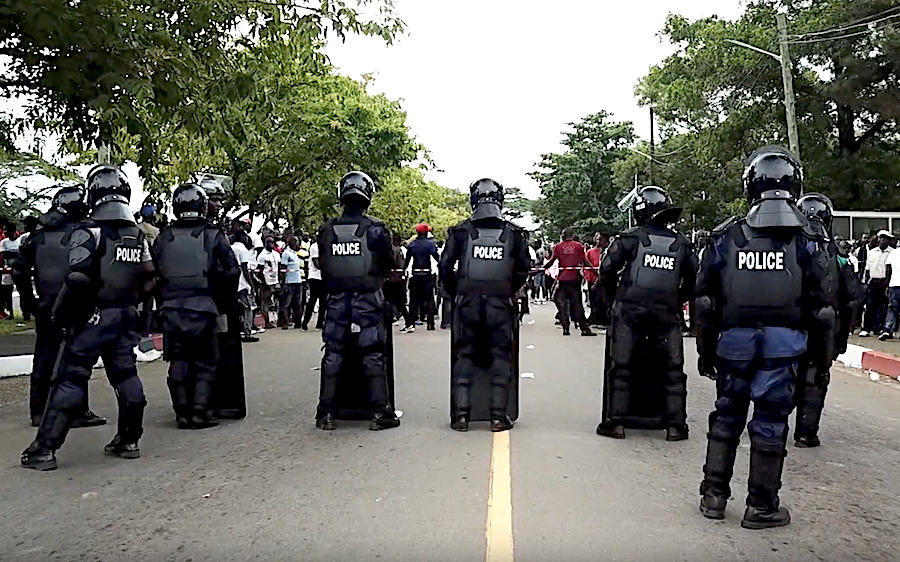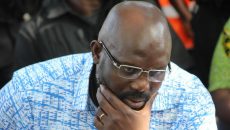Thousands of citizens in Liberia aired their grievances Friday in Monrovia, gathering and protesting inflation, corruption and “creeping dictatorship.†The government’s response? Shutdown social media platforms, including Facebook, Instagram, WhatsApp, and Snapchat.
One of the protest leaders, Henry Costa, told CNN, “We have come to say no to bad governance, abuse of power, corruption and creeping dictatorship.â€
The last time I checked, Article 15 of the Constitution of Liberia grants its citizens the right to freedom of expression, which includes freedom of speech and of the press. It “encompasses the right to hold opinions without interference†and “non-interference with the use of the mail, telephone and telegraph.â€
Article 17 states that, “All persons, at all times, in an orderly and peaceable manner, shall have the right to assemble and consult upon the common good, to instruct their representatives, to petition the government or other functionaries for the redress of grievances and to associate fully with others or refuse to associate in political parties, trade unions and other organizations.â€
So, we have a group of citizens assembling and petitioning the government about their grievances. The government doesn’t have to agree with their opinions, but it is not supposed to interfere. Instant messaging and social media sites are the equivalent to mail, telephone, and telegraph in the modern, digital era, and shutting those vital communications — not to mention shutting down an international news site — is clearly a constitutional violation.
The freedom to comment on or criticize the government, its institutions, policies, practices, and so forth is an important component of any free and democratic society. That the government responds by shutting down dissenting voices adds credence to their complaints.
There are several important steps the government can take to prevent the country’s economy from collapsing:
Asset declaration for all government officials — According to the World Bank, “Asset declarations of public officials are a powerful tool to prevent corruption, detect illicit enrichment and conflicts of interests.†Not only does it increase transparency, but public scrutiny and the exposure of unexplained wealth are also powerful weapons against corruption.
For example, in Argentina, Cristina Fernández de Kirchner served as president from 2007 to 2015. She had declared her assets. However, her personal wealth from 2003 increased by 1150 percent, causing scrutiny because it was unclear where the increase came from. Wouldn’t you want to know where and how a wealthy government official came into a large fortune? Wouldn’t you want answers if that wasn’t clear?
The United Kingdom was the first country to require asset declaration of public officials in 1974 followed by the United States, Spain, and Italy in the late 80s and early 90s. Other countries have followed suit; it’s time Liberia does the same.
The president needs to provide an explanation for the construction of mansions around Monrovia — Shortly after taking office, President Weah demolished his US$150,000 property and began construction on several multi-million dollar projects. Not only do we not have a full understanding of most government officials’ assets, Liberians are questioning the president’s acquisition of new assets just a few short months into his presidency. Meanwhile, Liberia’s economy has been nosediving, prompting many to question President Weah’s priorities.
The administration must take steps to address the endemic corruption in Liberia — Here are a few ideas: asset declaration as mentioned; open procurement and contracting practices; prosecution for corruption rather than looking the other way; and creating and enforcing laws that target the proceeds of corruption, money laundering, and crime.
Put Liberia’s citizens to work — Unemployment is a national security issue that should be addressed, especially among younger Liberians. With a youthful population hungry for opportunity and desperate to get out of poverty, high youth unemployment is not only disheartening, it’s a recipe for crime and civil unrest. Â
Embrace private sector participation — From healthcare and technology to power, construction, telecommunications, and beyond, the private sector will be the key driver to Liberia’s emergence. The government lacks the resources and expertise to fully build Liberia’s infrastructure on its own, and it shouldn’t have to. The private sector is better suited and motivated to handle the major undertakings Liberia needs to grow and thrive. Adopting measures to open its procurement and contracting practices is one approach to create a more transparent and competitive procurement process with private companies.
Liberian citizens are fed up with high unemployment, corruption, lack of services, bad governance, abuse of power, and what protesters say is a “creeping dictatorship.†The government’s response was to quiet their voices. Not only was this the wrong move from a constitutional perspective, it’s a lost opportunity to stop, listen, and reflect because, clearly, there’s work to be done.
Featured photo courtesy of Lloyd Massah



